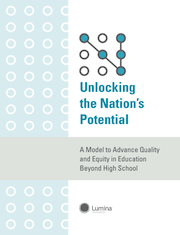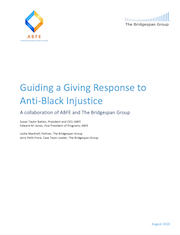Site Search
- resource provided by the Forum Network Knowledgebase.
Search Tip: Search with " " to find exact matches.

A report from Lumina Foundation and its Quality Credentials Task Force calls for a coordinated national effort to ensure equitable access to quality postsecondary education in the United States.
The report, Unlocking the Nation's Potential: A Model to Advance Quality and Equity in Education Beyond High School (32 pages, PDF), found that the current U.S. system of degrees, certificates, industry certifications, and other credentials lacks a comprehensive definition of quality as well as the kind of up-to-date indicators needed to drive improvements in policies and practices. To help guide efforts that ensure access to high-quality educational opportunities for students of color and advance racially and economically just outcomes, the task force — which includes nearly two dozen education, policy, and workforce development leaders — proposes a model based on a shared understanding of what a quality credential is, as well as institution-based curricular changes and systemic reforms at the federal and state levels.

The Bridgespan Group collaborated with ABFE to co-author "Guiding a Giving Response to Anti-Black Injustice," with additional input from proximate leaders. This memo offers philanthropy potential paths to invest in organizations and movements within the Black-led racial justice ecosystem. It provides principles for giving that can help funders make investments with sustained change in mind, and highlights priority investment areas and example organizations within those areas that represent tangible opportunities. Our list is not exhaustive, but rather a starting place for funders who seek to support Black-led organizations and movements committed to anti-racist social change.
Foundation funding in support of global human rights initiatives totaled $2.8 billion in 2016, up from $2.4 billion in 2015, according to the report from Candid and the Human Rights Funders Network. The report from the Advancing Human Rights research hub found that 785 funders in 43 countries awarded 23,016 grants to 13,242 organizations working to address the root causes of injustice and inequality and ensure the protection and enjoyment of internationally recognized human rights. Twenty-one percent of those grant dollars were awarded in the form of general support grants.
Funders are increasingly pledging to center equity in their work. But to do this, they need a baseline to know if they are reaching their goals.
Allie VanHeest of the Kalamazoo Community Foundation, and Jennifer Chheang of The California Endowment will share how Demographics via Candid, is helping funders measure their progress, while also reducing the paperwork burden on nonprofits.
Join this conversation hosted by Demographics via Candid partner Grantmakers for Effective Organizations (GEO).
Cost: Free for CNJG Members and Non Member Grantmakers
The Silicon Valley Out-of-School-Time Collaborative invested in a cohort of regional nonprofit organizations to sustain and strengthen their ability to serve more students with stronger academic and social-emotional programming. Partners in the collaborative included three family foundations that together made an initial $1.6 million pooled investment over three years, and eight nonprofits that collectively served more than 7,000 low-income middle and high school students outside normal school hours. From the start of the partnership, funders and grantees held regular meetings focused on shared learning, trust building and dialogue. A midcourse evaluation of the collaborative showed that grantees were stronger, programs were better and are reaching more students, and funders had adopted new, collaborative grantmaking practices. The funders invested another $900,000 into a second phase of the work and committed to more flexibility –– letting grantees drive the group’s planning and learning efforts, and manage consultants, budgeting and group communications. Grantees also opted to redirect the focus of the collaborative from capacity building to program development and evaluation, with the added goal of sharing effective afterschool and summer program models with others, both inside and outside the region.
How can funders reduce the burden on grantees when requesting demographic data? What information are funders collecting from their nonprofit partners, and what information is needed to make informed decisions and build trusting relationships?
Funders are increasingly requesting demographic data from nonprofits to better understand the types of organizations and leaders that they are—and are not—supporting. Due to the lack of comprehensive and public demographic data available, nonprofits experience a heavy burden to provide the information in a variety of ways and formats.
Join this webinar to learn how to reduce the administrative work for grantees throughout the due diligence and grantmaking processes and beyond. We’ll explore tools that can help streamline the process of collecting, evaluating, and sharing information for mutual benefit.
Cost: This event is free for CNJG Members who are family foundations.
Other types of foundations are ineligible to join this webinar.
This program is a CNJG membership benefit for family foundation members, including staff and trustees, in partnership with the National Center for Family Philanthropy.
An overview on the self-dealing law, including definitions, common problem areas, exceptions, penalties, and resources.
